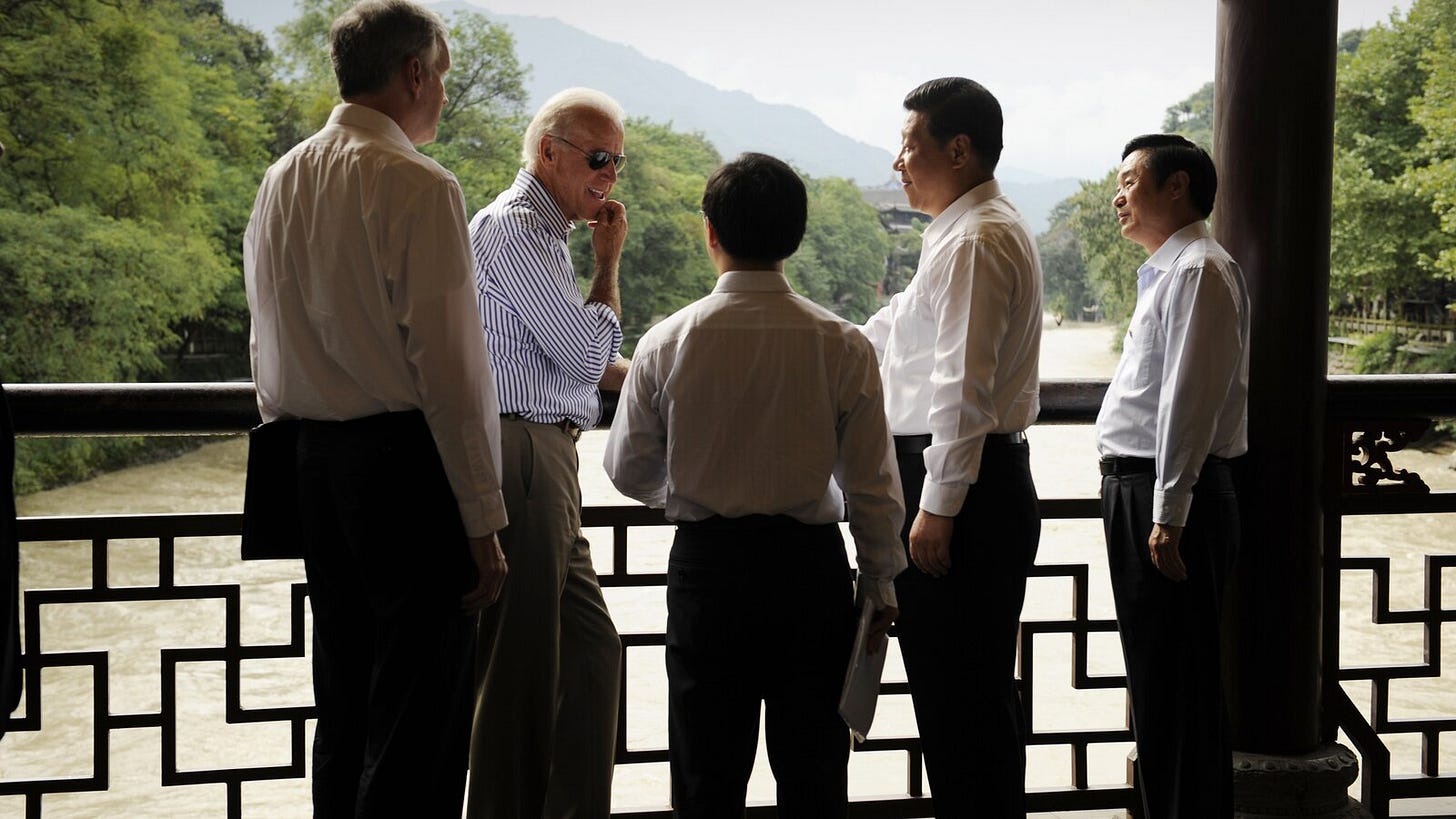America Last: Biden, China, and the Trade Agreement He Ignored
Imagine negotiating the most consequential trade pact between the US and China in decades. Now imagine watching your successor not only ignore its enforcement, but offer China the benefits of the agreement without demanding its obligations. That, in essence, is what happened to President Trump’s Phase One trade deal, an agreement whose abandonment by President Biden may represent one of the costliest acts of economic negligence in modern history.
The Phase One agreement, signed in January 2020, was clear in its aims. China committed to purchasing an additional $200 billion in US goods and services over 2017 levels by the end of 2021. These included specific, measurable amounts across manufactured goods, agricultural products, energy resources, and services. The commitments were not vague aspirations. They were binding targets, tied to the reduction of US tariffs.
China also agreed to end the coerced transfer of American intellectual property, halt requirements that US companies turn over proprietary technology as a cost of market entry, allow American financial institutions access to its tightly controlled markets, and cease the deliberate devaluation of its currency. These are not incidental features of global trade. They strike at the core of US competitiveness, innovation, and sovereignty.
In return, the US reduced tariffs on certain goods. This was not an act of trust, but of reciprocity. The structure of the deal was, to borrow from Hamilton, a "quid pro quo" enforced by the weight of economic leverage. But that leverage only holds if it is wielded. And Biden, despite inheriting both the deal and the tools of enforcement, chose to set them aside.
According to Treasury Secretary Scott Bessent, after two days of direct negotiation with the Chinese delegation last weekend, it was revealed that Beijing made a calculated decision. When it became evident that President Biden had no intention of enforcing the agreement, Chinese officials concluded they could safely disregard its terms. They were right. No formal objections, no diplomatic protests, no sanctions followed from Washington. China ignored the deal. Biden ignored China.
What might the consequences have been had Biden simply enforced what had already been signed? Let us consider the counterfactual. Had China fulfilled its obligations, US manufacturing firms would have seen a surge in demand. American farmers, already battered by the pandemic and inflation, would have sold tens of billions more in produce. Energy exports, particularly in natural gas and oil, would have grown substantially. Financial giants like JPMorgan Chase and MetLife, once poised to enter the Chinese market under the agreement, were stalled.
And the tax revenue? According to projections from the Peterson Institute for International Economics, full Chinese compliance with Phase One would have injected between $300 to $400 billion in direct US economic activity, which, when multiplied across sectors, could conservatively yield over $4 trillion in aggregate GDP gains over four years. Not only would this have bolstered federal revenues, it would have mitigated the post-COVID economic drag that haunted much of Biden's first term.
Even more crucially, enforcement would have demonstrated resolve. Beijing respects strength, not sentiment. The Trump administration understood this. Biden's failure to enforce the deal projected a message of indifference, even supplication. Consider the optics: the US lowered tariffs, China pocketed the benefit, and America got nothing.
But why? This is where speculation becomes warranted. Why would an American president surrender billions in export gains, thousands of new jobs, and core leverage over China, unless something more than mere negligence was at play? Was it gratitude for Chinese largesse at the Penn Biden Center, a think tank underwritten by anonymous Chinese donations? Was it an act of quiet reciprocity for Chinese-linked investments in Hunter’s ventures? Was it incompetence dressed up as strategic patience? Whatever the reason, the effect was the same: American workers and taxpayers paid the price.
That price is not theoretical. As Secretary Bessent confirmed, the Chinese delegation indicated that had the US enforced the agreement, they would have complied. Their calculus was rational: no enforcement, no compliance. This is not a mystery. It is a rule as old as law itself.
Furthermore, Phase One was not merely about economic metrics. It was about systemic fairness. For decades, China exploited the World Trade Organization system, presenting itself as a developing nation while pursuing mercantilist practices with ruthless efficiency. Phase One was the first serious attempt to stop that game. And for a moment, it did. But Biden handed Beijing a reprieve.
The argument that Trump’s trade war was chaotic misses the forest for the trees. Negotiation is often ugly. Diplomacy is not about theatrical elegance, it is about results. Trump got results. Biden got rolled.
Even now, there is hope. Secretary Bessent has secured a Chinese commitment to return to the Phase One framework and begin preliminary steps toward Phase Two. But it will be an uphill climb. Trust once squandered is difficult to regain. Leverage, once forfeited, must be rebuilt from scratch.
The lesson here is painfully clear. Trade agreements, like treaties, only function when enforced. A deal without enforcement is not diplomacy, it is appeasement. A contract ignored without consequence is not strategy, it is surrender.
Biden, whether through neglect or design, surrendered America’s advantage. He gave away the benefit, while shielding China from the cost. He did not merely fail to act, he allowed the deliberate erosion of American leverage, productivity, and standing.
We must not make that mistake again.
If you enjoy my work, please consider subscribing https://x.com/amuse.




Thanks for your hard work and insight. You are performing an important public service